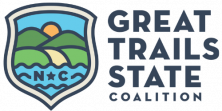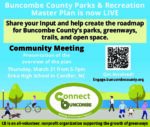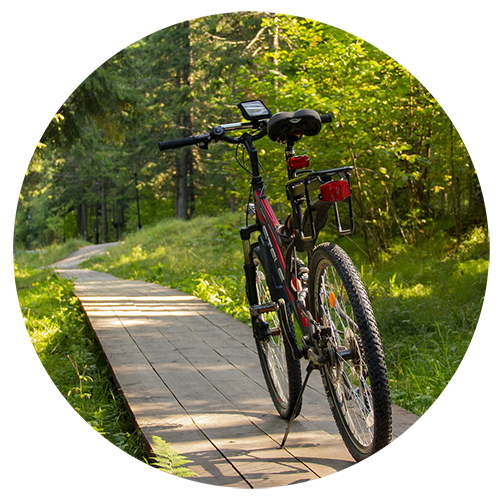ASHEVILLE – Greenways rank among the city’s most popular amenities.
But high construction costs and other setbacks have meant many planned paths remain unbuilt. Recent estimates show four “shovel-ready” greenways would cost $4 million more than city staff estimated less than a year ago.
Now officials are looking to boost the path network by moving away from a paved-only system toward temporary or even permanent unpaved lanes for walkers, cyclists and others.
The City Council last month approved partial construction of a greenway using “gravel fines,” a type of crushed stone. And on Wednesday, city staff and greenway advocates are holding a public event promoting “natural surface” trail systems.
Rising greenway costs
Estimates to build four “shovel-ready” greenways have climbed since February, in part from higher construction costs and in part because earlier projections underestimated expenses.
- Beaucatcher Greenway:$6.5 million (up from $4.7 million)
- Bacoate Branch Greenway (formerly “Clingman Forest Greenway”): $4 million (up from $3.6 million)
- French Broad River Greenway:$4 million (up from $3 million)
- Town Branch Greenway: $4 million (up from $3.2 million)
In years past, officials have declined to include in the official network unpaved paths such as Hominy Creek Greenway, a volunteer-supported trail along the West Asheville creek.
That was because of concerns about meeting Americans with Disabilities Act requirements, said city Greenway Commission Chairwoman Mary Weber.
“Primarily the ADA, that was the main thing, and I think maintenance,” Weber said.
Several of the greenways were tied in with a multimillion dollar overhaul of the River Arts District, and when spring bids for the RAD came in $26 million over budget several of the paths were temporarily shelved.
Beaucatcher Greenway was not part of the RAD overhaul but also saw cost increases, from $4.7 million in February to $6.5 million. That path above McCormick Field drew criticism from some residents and former city councilman Cecil Bothwell who said the plan to replace a well-used fire road with snaking asphalt switchbacks would eat up too much of the mountain and take down too many trees.
Now Weber and others are saying it might make sense to leave Beaucatcher unpaved and are pointing to Hominy Creek as a “pilot project.”
The shift could reduce Beaucatcher’s cost alone by nearly $5 million down to a total construction price tag of $1.8 million.
Weber said the idea is to “just to get trails on the ground,” so people can start using them. On high traffic trails, or paths with more erosion potential, the natural surface would be an interim step. For other trails, the natural surface could be permanent, the chairwoman said.
As for disability access, if central greenways, such as the planned French Broad River West path, are paved that should fulfill requirements, she said.
Some unpaved paths could still be accessible to wheelchairs and others with limited mobility, Weber said.
Already there are plans to move forward with the concept south of downtown.
In November, the council approved construction of a “gravel fines” path on the western portion of the Town Branch Greenway.
The full paved version of that path from Depot Street in the west to Phifer Street in the east was estimated at $3.2 million in February then climbed most recently to $4 million. Creating a crushed stone path on part of the route from Depot east to South French Broad Avenue would cost $7,400 with the city seeking a $5,000 grant to cover most costs.
‘Asheville Unpaved’ public event
The city of Asheville’s Greenway Warmer event is free and open to the public. It will give an update on the greenway system and talk about the “Asheville Unpaved” concept. The warmer is 6:30-8 p.m. Dec. 13 in the first floor conference room of the Buncombe County Administration Building, 200 College St. Light refreshments will be served.
The featured speaker is Carol Evans, of Legacy Parks Foundation of Knoxville, Tennessee, the group behind the nationally recognized 50-mile unpaved trail system in the Knoxville Urban Wilderness, next to that city’s downtown.
“The Urban Wilderness is helping to revitalize the South Knoxville community, and is estimated to have a $15 million economic impact annually,” a release from event organizers said.
Co-sponsors are Friends of Connect Buncombe, Asheville on Bikes and Equinox Environmental.
http://www.citizen-times.com/story/news/local/2017/12/10/asheville-greenway-shortage-paved-vs-unpaved-french-broad-greenway/931903001/





